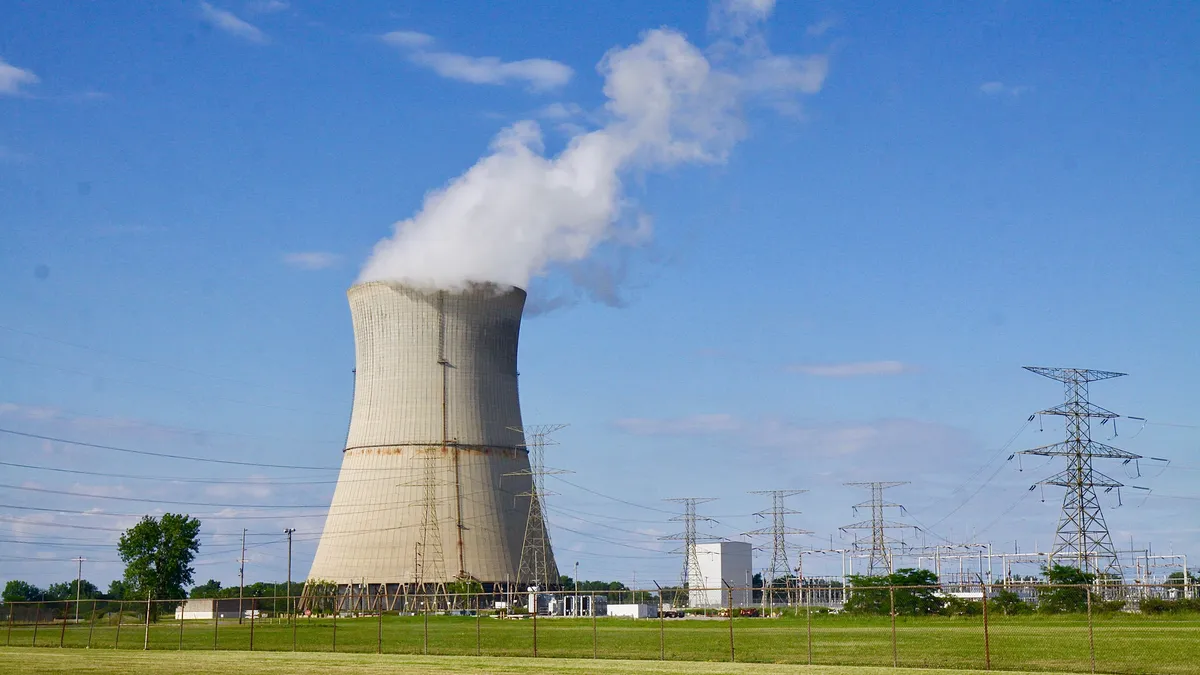Dive Brief:
- Vistra, a Texas retail electricity and power generation company, announced Monday a $3.43 billion deal acquiring Energy Harbor, an Ohio nuclear power and retail energy business, as it capitalizes on federal tax credits to move more deeply into nuclear energy.
- The deal, which is expected to close in the second half of the year, will combine the nuclear and retail businesses of both companies with Vistra Zero renewables and storage projects in a newly formed subsidiary holding company, Vistra Vision.
- Vistra says it’s the fourth largest owner of merchant nuclear power in the U.S. and Energy Harbor is the second largest. The transaction would create the second-largest competitive nuclear fleet in the U.S., Vistra said.
Dive Insight:
The deal will accelerate the growth of Vistra's zero-carbon operations, adding about 4,000 MW of nuclear capacity and about 1 million retail customers, Vistra said.
Energy Harbor says it supplies about 33 terawatt-hours of nuclear power to customers in the PJM Interconnection market annually, enough to power more than 3.5 million homes and businesses. It owns and operates three nuclear plants in Ohio and Pennsylvania.
Vistra Vision will be a large-scale zero-carbon generating business, supplying about 7,800 MW to approximately 5 million retail customers in the U.S. It will have access to a pipeline of 1,100 MW of renewables projects, Vistra said.
Vistra will pay $3 billion in cash and Vistra Vision will assume $430 million in net debt from Energy Harbor.
"Vistra has been focused on responsibly transitioning our power generation profile, and though we've made significant progress over the past several years, there are few opportunities to grow a reliable and dispatchable zero-carbon generation portfolio at scale this quickly,” Vistra President and CEO Jim Burke said in a news release
Nuclear energy is carbon-free and a “dependable, always-on source of reliable power,” he said. He cited the Inflation Reduction Act’s nuclear production tax credit that “now has down-side protection against lower power prices, resulting in tremendous upside opportunity compared to other generation with similar attributes."
The IRA offers $25 per MWh for the first 10 years of a nuclear plant’s operation. For new zero-carbon power plants placed into operation in 2025 or later, the law provides a 30% investment tax credit.
Two industry analysts praised the deal.
Toby Shea, vice president and senior credit officer at Moody's Investors Service, said Vistra's acquisition of Energy Harbor is positive “from a business risk perspective as Vistra grows in size, increases both generation and geographic diversity, reduces Texas market exposure and lowers carbon transition risk."
He said Vistra's leverage will rise this year due to the acquisition, but expects it to recover in 2024.
Guggenheim Partners analyst Shahriar Pourreza said the acquisition “marks a logical step toward diluting the longstanding bear argument around the terminal value of Vistra’s fossil assets.”
The deal’s separation between legacy and growth businesses – the nuclear and retail businesses and renewables and storage projects – is a “familiar strategy,” he said, comparing it to automakers drawing a line between their internal combustion and electric vehicle businesses.
As part of the deal, Vistra Vision’s two largest shareholders, Avenue Capital Group and Nuveen, will receive a combination of cash and 15% ownership interests in Vistra Vision.
Vistra will not acquire Energy Harbor's legacy conventional generation fleet. Energy Harbor has previously signed definitive agreements to sell these assets to third parties.
Energy Harbor is a former subsidiary of FirstEnergy, which is working through issues related to bribes it paid in support of Ohio energy legislation known as HB6 that provided about $1 billion to two nuclear plants. The sale of Energy Harbor fulfills a key goal of HB6 backers to sell the company’s two Ohio nuclear plants, according to cleveland.com. Lawmakers have repealed the law intended to support the plants.















